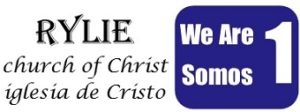Bulletin for 6-12-22
Birthdays and Anniversaries:
6-12 David Weeks
Prayer requests:
Paul Tyler has a bad sort Parkinson’s. Please pray for him.
Abby Garza recovering from her surgery
Darlyne Stewart, Karl’s sister, having some breathing problems due to treatments.
Shirley Weeks, Steve’s mom, is not well.
Sharon Best, Steven’s mom, finished chemo, declared in remission.
Sarah, Chris Girvin’s sister, on hospice care
Robert and Sue Waller, health issues.
Darla Nitti, Wendi’s mom, stage 4 kidney disease, stroke. New living situation!
Leta, has a recurring cancer, prayer request from her granddaughter via our website.
Tammy Jones, Weeks’ neighbor, kidney failure/dialysis
Article:
Agency, autonomy, and unity
The New Testament pattern calls for congregational autonomy, Christian agency, and unity in truth.
Autonomy refers to “the quality or state of being self-governing.” Agency broadly means the “ability to take action or to choose what action to take.” One might define unity as “oneness of mind, feeling, etc., as among a number of persons; concord, harmony, or agreement.”
Each congregation is subject to Jesus who is head of the body, the church (Colossians 1:18; Ephesians 1:22), and has all authority (Matthew 28:18). Each congregation submits to the law of Christ (Galatians 6:2; 1 Corinthians 9:21; James 2:8). No authority in scripture can be found for an overarching human institution that gives direction to the local body.
Elders shepherd the flock which is among them (1 Peter 5:2). No eldership may demand submission from outside congregations, either near or far.
Each individual is responsible for his or her own behavior. Sin is attributed to the sinner, not to the friends or family of the person. The principle of the soul who sins shall die (Ezekiel 18:20) has always been true.
Each person is given agency to make decisions in his life. Every person has the freedom to choose to obey or reject Christ. Every Christian has the ability to walk in the light or in darkness (see 1 John 1:5-10).
Each congregation has autonomy and each Christian has agency; however, that does not mean that congregations and Christians have no role to play in the work and lives of others.
Congregations should expect help from other congregations. The local body has a responsibility to help those of its number financially (see Acts 6:1-7; 1 Timothy 5:16, 18). But moments may arise when everyone is overburdened. It is then that help from the outside should be given (1 Corinthians 16:1-3; 2 Corinthians 8:1-5). If a congregation needs help with evangelism or with defense of the truth, other congregations should step up (2 Corinthians 11:8; see also Acts 13:1-3).
Individuals should expect help from other Christians. We are joined together in a family. Note carefully the instructions that Paul gives Timothy, “Do not address an older man harshly but appeal to him as a father. Speak to younger men as brothers, older women as mothers, and younger women as sisters – with complete purity” (1 Timothy 5:1, 2). Over and again Christians are referred to as brother or sister (Romans 16:23; 1 Corinthians 1:1; 2 Corinthians 1:1; 2:13; Philemon 1:1, et al.). This is natural because we are God’s children (1 John 3:1), and members of his household (Ephesians 2:19).
Each Christian must carry his own load (Galatians 6:5), but we are to carry one another’s burdens (Galatians 6:2). The help we should expect is not just financial or emotional support but spiritual guidance and correction.
“Brothers and sisters, if a person is discovered in some sin, you who are spiritual restore such a person in a spirit of gentleness. Pay close attention to yourselves, so that you are not tempted too” (Galatians 6:1).
Kindly confronting the sin of others is a responsibility of Christians, and something to which all Christians should submit (Ephesians 5:21). Paul said that “there are many rebellious people, idle talkers, and deceivers, especially those with Jewish connections, who must be silenced because they mislead whole families by teaching for dishonest gain what ought not to be taught” (Titus 1:10, 11) The solution is that Titus was to “rebuke them sharply that they may be healthy in the faith” (Titus 1:13). Our goal is never to win an argument but to win souls to Christ (2 Timothy 2:24-26).
Likewise, when congregations begin to head down a wrong path, and elders and preachers proclaim that which is not in accord with sound doctrine, other congregations have an obligation to help. Out of love for each Christian and for the purity of the bride of Christ (Ephesians 5:22-33), we must act with caution, humility, and love.
While each congregation is autonomous, and every Christian has agency, we are united in Christ. Let us all do our best to walk according to the rule and to promote peace and truth among God’s people.
Lee Parish, link to original article







